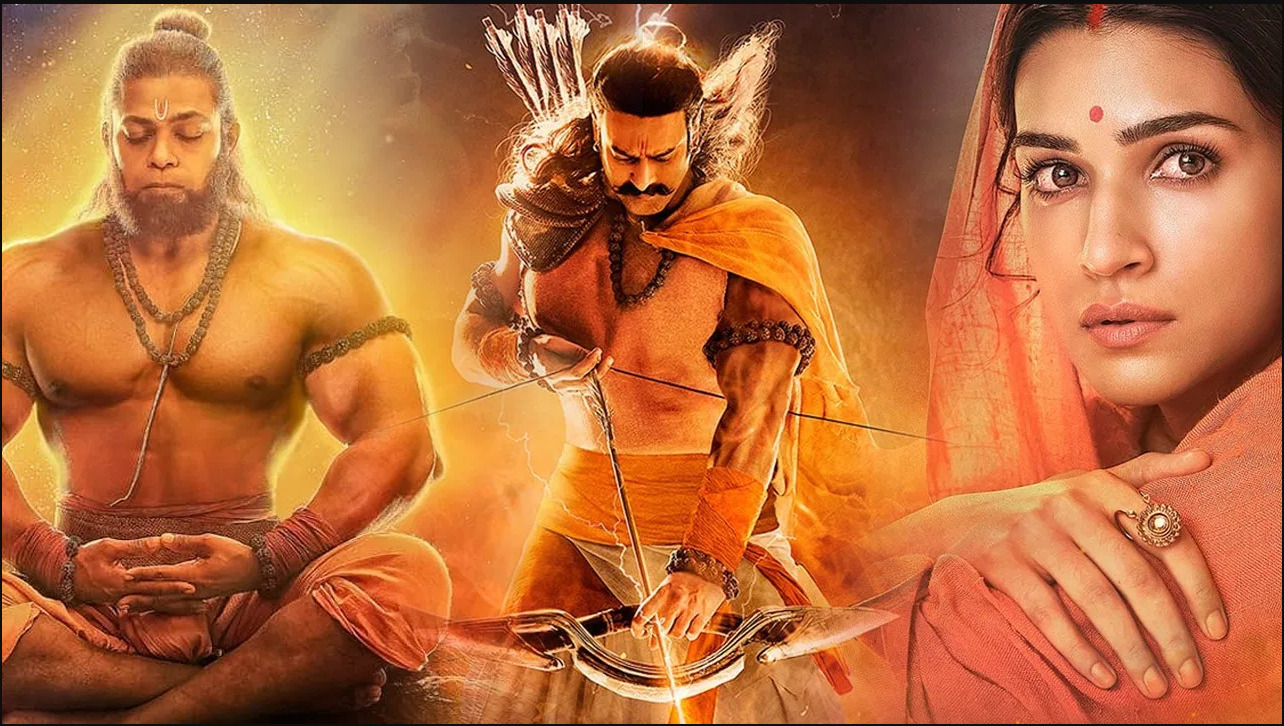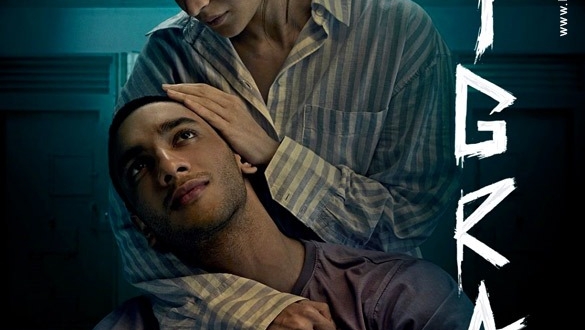I hope I am not boring you with my posts on Adipurush, a movie that you seem to hate as I believe it has shown certain things that hurt Hindu sentiments. People have been criticizing Lord Ram and Sita’s attire, Bajrang Bali’s facial hair, and also the way Ravan has been depicted in Adipurush. However, mind it that I am not really praising the action-adventure drama Adipursuh, but I am singing the praises of the original Hindu epic Ramayana, which you must be very well familiar with.
So, in this post, I am presenting some interesting facts about Ramayana which some of you may be familiar with if you are a Hindu like me. I have acquired knowledge of Ramayana over the decades and these are very minor portions of the massive knowledge of Ramayana that I have accumulated. If you want proof of these facts, I would advise you to read Ramayana by yourself.
Did Prabhu Shri Ram Really Exist?
International researchers have found that the Ramayana, which was written by Sage Valmiki 10,000 years ago, is actually based on a chronicle of events and characters recorded by him. This is not a work of fiction. This really happened during his era.
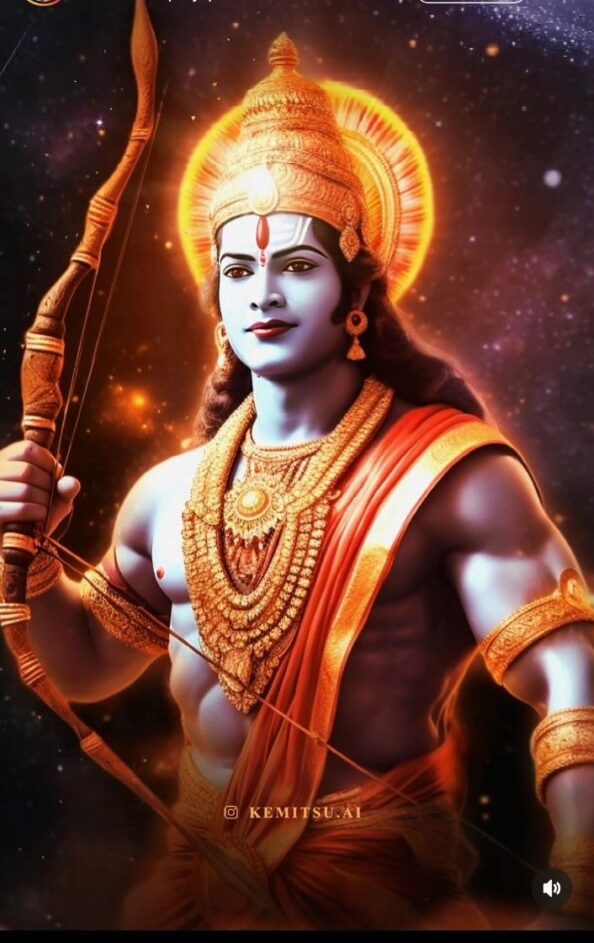
Prabhu Shri Ram, as depicted in Hindu mythology
People justify the existence of Lord Ram with the Ram Setu a.k.a. the Adam’s Bridge, which is a chain of natural limestone shoals connecting India and Sri Lanka. But the major conflict with this concept lies in the fact that Sri Lanka was not the actual Ravan’s Lanka. In Ramayana, the location of the island nation of Ravan’s Lanka is somewhere in the middle of the Indian Ocean where the Mauritius Islands and British Islands are situated at present. So I would like to ask you, how come Lord Ram built the Ram Setu to travel to Sri Lanka when Sri Lanka was not the actual Ravan’s Lanka? Think logically!
As of now, there is no actual proof of the existence of Lord Ram. But there is proof of the existence of Lord Bajrang Bali. It is said that Bajrang Bali, being an avatar of Lord Shiva, had the superpower to alter his form and assume the height of a behemoth giant and he could even become small like an ant. Near Ashokvan in Sri Lanka, where Ravan was supposed to have kept Sita, there are massive footprints of Lord Bajrang Bali. These footprints are from the time when Bajrang Bali traveled to “Lanka” to meet Sita. Note that it is still unsure whether Sri Lanka was Ravan’s Lanka. The footprints are massive! While he walked, the footprints differ as he changed his form from his enormous size to his original size upon reaching Lanka. But does this mean then Sri Lanka was actually Ravan’s Lanka? Who knows, these all happened very long ago for anybody to estimate the correct facts. If Bajrang Bali was real, and Ravan was real, which I will be proving in the next sections, so was Lord Ram.
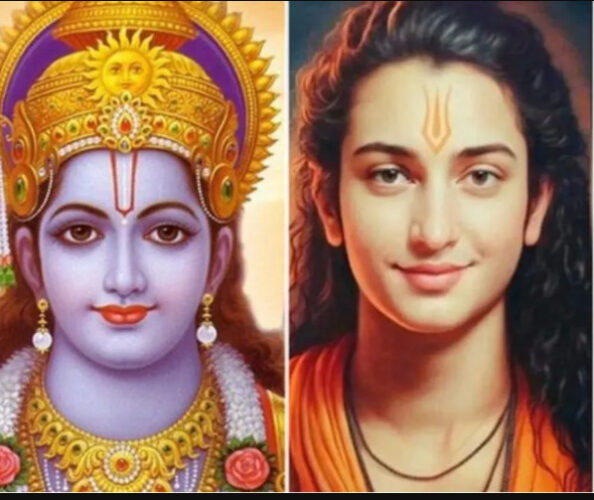
Right: An AI-generated image of Prabhu Shri Ram based on his description given in Ramayana, depicting what he might have looked like when he was 21 years old. He has been mentioned to be 8 feet tall in Ramayana.
Legends say that after rescuing Sita from Ravan, Lord Ram doubted her chastity. She had to go through the “Agni Pariksha”, which means “trial by fire”, to prove her purity to her husband. She had to enter a burning pyre to prove herself as “pure”. She proved her purity as the fire did not burn her, and she came out unscathed.
Legends also say that as Ravan arrived to kidnap Sita, she prayed before the Fire God “Agni Dev” and the Fire God created her exact double. It was Sita’s exact lookalike, not her, whom Ravan had actually taken to Lanka while the Fire God took the real Sita to heaven with him. Therefore, Ram was bound to perform the Agni Pariksha on Sita. When the lookalike of Sita was made to enter the fire, the Fire God destroyed the lookalike and restored the real Sita. This was the actual reason why Ram performed the “trial by fire” on Sita, according to other legends.
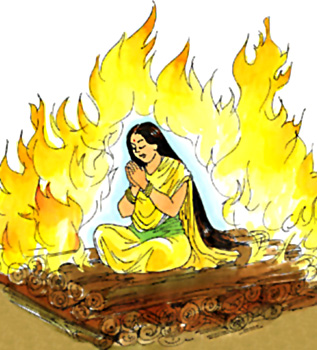
An image showing Sita’s Agni Pariksha
Was Ram’s Biggest Devotee, Bajrang Bali a.k.a Lord Hanuman, Really A Half-Man And Half-Monkey?
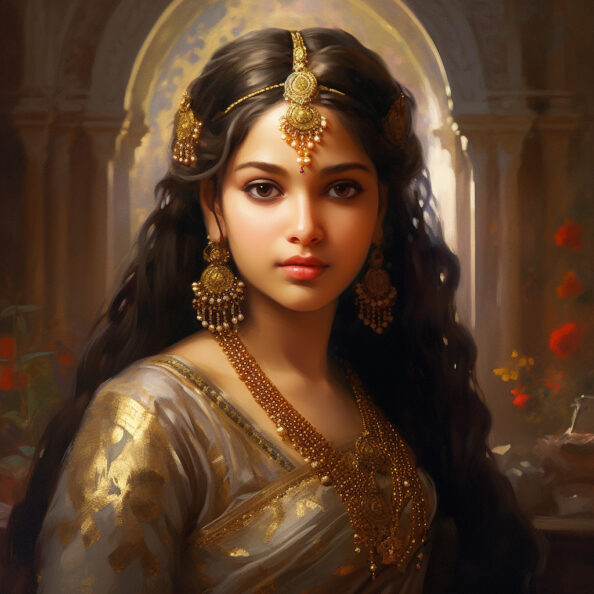
AI-generated image of Sita, according to her description in Ramayana
After my research on Lord Hanuman a.k.a Bajrang Bali, who was Lord Ram’s biggest devotee, I came to the conclusion that he was no half-man and half-monkey. He was a human being just like you and me. A big, tall, sturdy man, even bigger than any giant WWE wrestler you have ever seen. I will now tell you the reason, why he has been depicted as a man-monkey in Ramayana. Actually, he belonged to the “Vanar” sect of the then society. The word “Vanar” means “monkey” and that’s the reason people usually “imagine” him as a monkey. In reality, he was neither a monkey nor a half-man and half-monkey. He was a forest-dwelling man. So, were the other Vanars. Just like Bajrang Bali, they were not chimpanzees, gorillas, and baboons, but they were forest-dwelling men who went with Lord Ram to Ravan’s Lanka to rescue Sita.
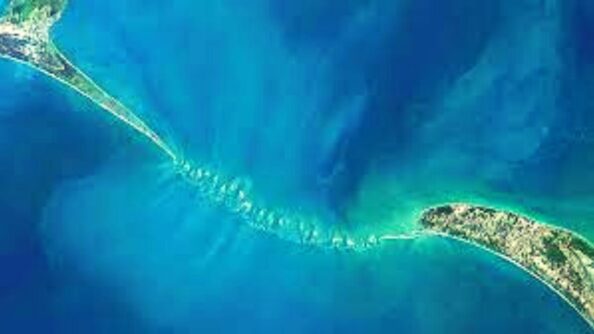
The Ram Setu connecting India and Sri Lanka, which is said to have been built by Lord Ram and his Vanar troops
You might have heard of Bollywood star Tiger Shroff. Does his name “Tiger” mean that he has a head of a tiger and a body of a man? No! Jokes apart, the same is the case with Bajrang Bali a.k.a Hanuman. People simply can’t stop imagining him as a half-man and half-monkey just because of the “section” or “caste” of the then society to which he belonged as per Ramayana.
When Lord Ram first met Bajrang Bali, he talked to him and was impressed with his wisdom. He told his younger brother Lakshman about Bajrang Bali. Ram asked Lakshman in the Sanskrit language –
II Na Ana Rigved Vinitasya Na A Yajurved Dharina
Na A Samved Vidusha Shakyam Evam Vibhashitum II
This means, “The person with whom I just talked to was well-versed in all the four Vedas. Who is this enlightened man who is well-trained in the Rigveda, has enormous power to remember the Yaajurvda, and has achieved scholarly knowledge of the Samveda? The manner in which he talked to me, this type of impressive conversation is impossible without Vedic knowledge!”
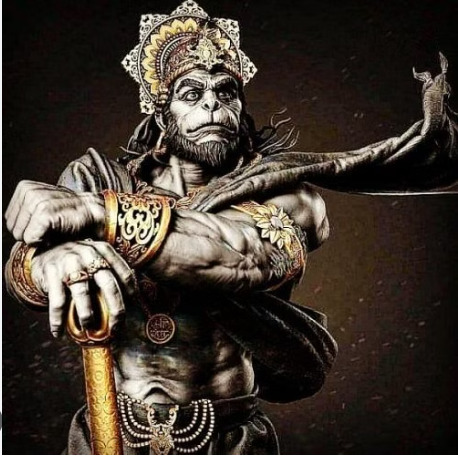
Lord Ram’s biggest devotee, Bajrang Bali was the avatar of Lord Shiva. We imagine him as a man-monkey but in reality, he was not so.
So, do you think that such a learned man who had achieved all the wisdom of this world, can be a monkey? No! Never! Lord Hanuman or Bajrang Bali was a human just like you and me.
Bajrang Bali was the avatar of Lord Shiva. There are tales where Bajrang Bali went to Sita and asked her for some food. Sita then started preparing meals for Bajrang Bali and kept on serving him. But the more she served, the more he ate! This continued until Sita became worried that very soon all her supplies will be over if Bajrang Bali kept on eating like that. Bajrang Bali kept on asking for food and Sita went on serving him. Sita then pleaded before Lord Shiva that if Bajrang Bali’s hunger is not satiated soon, all her supplies may get over. It was then Lord Shiva appeared behind Bajrang Bali. Sita saw to her amazement that it was Lord Shiva himself who was devouring her supplies, as Bajrang Bali was none other than an avatar of Lord Shiva. Lord Shiva, in fact, was testing her. It was then Lord Ram who gave a tulsi leaf to Sita with his name written on it and asked her to feed it to Bajrang Bali. Upon consuming the tulsi leaf, Bajrang Bali gave a massive belch as his hunger was satiated.
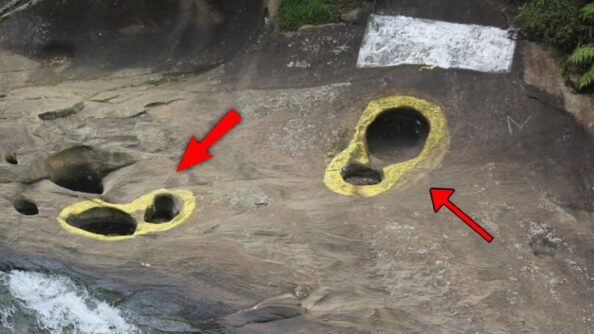
Massive footprints of Bajrang Bali in Ashokvan in Sri Lanka where Ravan is said to have kept Sita
As per Valmiki’s Ramayana “Uttar kand 36.23”, Lord Brahma said to the God of the Winds, “Your son, Bajrang Bali, will be terrible towards enemies and will be invincible to friends. No one can defeat him in wars!” And that’s how Bajrang Bali was. He was invincible and possessed divine powers to do things that would seem impossible to anybody.
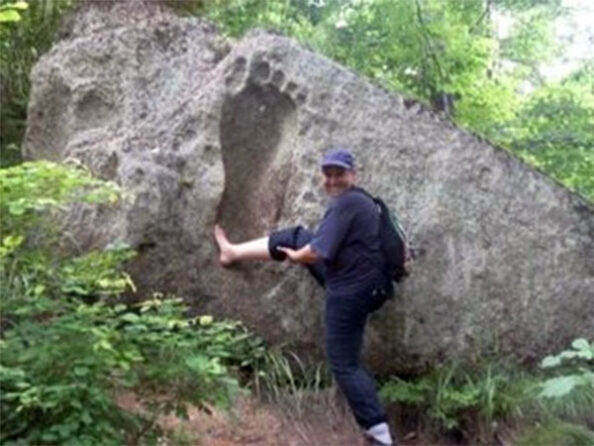
Another massive footprint of Bajrang Bali found in India
According to Hindu mythology, Bajrang Bali possesses the gift of immortality. As a celestial being and an incarnation of Lord Shiva’s divine energy, it has been said that Bajrang Bali will reside on the Gandhamadan mountain in Kaliyug (which is now), transcending the boundaries of time and mortality. You may not believe this but as per reports, he is still alive, but is in the form of energy. He is an avatar of Lord Shiva and so, he is not visible to the naked eye in Kaliyug. It is said that, at present, he is meditating in the mountains.
You must be thinking, what rubbish I am speaking of. These are facts based on my research and let me tell you, I am from a science background. Science does not believe in God. But there are certain things on this planet that science fails to explain.
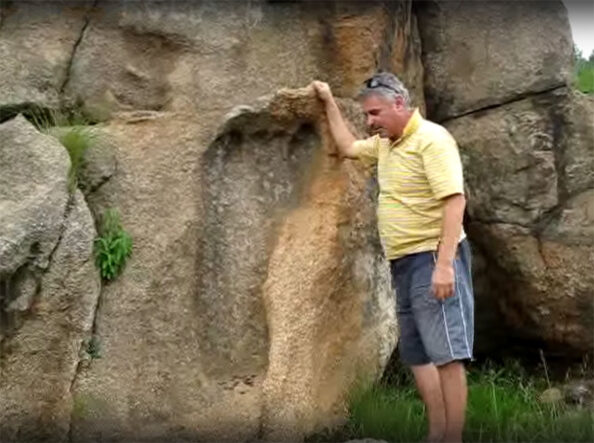
Yet another footprint of Bajrang Bali was found in Andhra Pradesh in India. These are not sculpted footprints. History claims that these ancient footprints have been made by some monstrous human. As per claims, that can be Bajrang Bali only in his behemoth form.
Ravan – The Brahmasur: Proof Of His Existence
Ravan was actually a half-Brahmin and half-demon. That’s why he is often referred to as Brahmasur. Ravan’s father was Vishwashrava, who was a Brahmin and his mother was Kaikasi, who was a demoness.
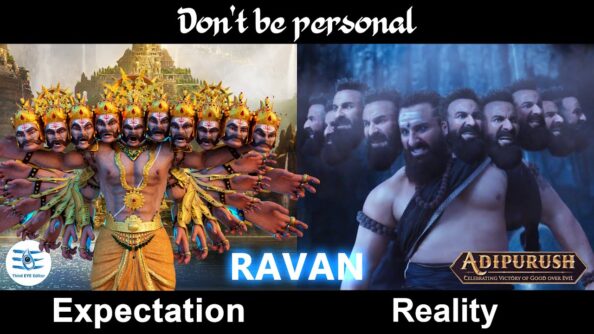
I would like to clear up the misconception that most people have regarding Ravan. Ravan has been represented as a demon with ten heads. That’s what we think! Because Ravan represents evil, so we imagine him as a demon with ten heads. But this is far from reality. Ravan was a human with great powers, and he lived 10,000 years ago. There is no arguing to the fact that the man was huge! He stood at a staggering height of 16 to 18 feet, that’s why he is often represented as a demon. And also because of his evil manners, where tales reveal that he once tried to rape a damsel named Rambha who was the consort of Nalakuvara, the son of the God of wealth Kuber. So, the angry Nalakuvara cursed Ravan that if he tries to even touch any woman without her consent, his head will blow up into pieces. And mind you, in earlier times, the curses of Gods and sages were so powerful that if they cursed someone, that person was sure to be doomed. As a result, after Ravan abducted Sita, he didn’t do anything wrong to her. That’s the reason Sita remained pure in Ravan’s captivity. He never touched her.
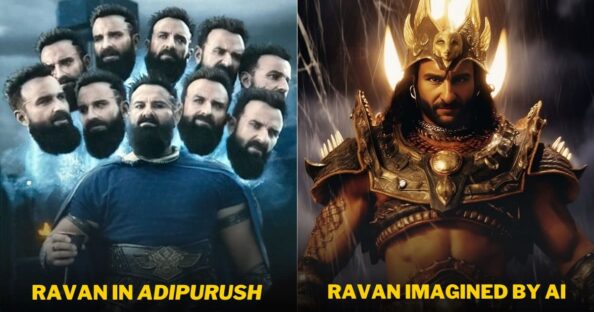
Now, I would like to talk about the ten heads of Ravan. You are wrong if you think that Ravan used to have ten heads or that those ten heads appeared whenever he wished them to. Actually, ten heads signify how learned and wise Ravan was. If you think that he was a cruel and wicked ruler, then you are mistaken. As a ruler, Ravan was magnificent, and he was also a great devotee of Lord Shiva. Under him, the kingdom of Lanka shone with gold and prosperity. The ten heads of Ravan actually represent that he had mastered all of the six Shastras and four Vedas in Hinduism. That’s why he is said to possess the “wisdom” of ten heads. He did not actually have ten heads. Also, Ravan and his kingdom of Lanka depicted in Adipurush are absolutely fake. The kingdom of Lanka shown in Adipurush has been depicted to be covered in darkness and surrounded by monstrous creatures. This is far from reality! The real Lanka. described in Ramayana, used to shine in gold and was the most glamorous kingdom you would have ever seen.
Talking about Ravan’s existence, he did exist around 10,000 years ago. He had authored books like “Ravan Samhita” which focuses on Lord Shiva’s worship, astrology, and medicine. He had also written the book “Arka Prakasham” which focuses on Siddha Medicine. I have both the books with me and they have been legitimately written by Ravan. I have to tell you, instead of abusing Ravan, if you read the books which he had written, you will become one of the wisest persons in this world. Ravan was also a maestro veena player and he himself had composed the “Shiv Tandav Stotram” which Hindus chant even today.

AI-generated image of Ravan’s Pushpak Viman, the airplane of the pre-historic era!
If you ask me, I would say that Ramayana may be a semi-fiction that had been woven around a great learned king who ruled over the land of Lanka many years ago. If you think, the airplane was invented by the Wright Brothers in 1903, then too you are mistaken. Ravan had his own “airplane” in which he had abducted Sita. There was no Godzilla-sized flying vampire bat that has been shown in Adipurush. Ravan’s airplane was called “Pushpak Viman” and he used to fly from Lanka to India crossing the Indian Ocean on that. It is said that Ravan actually had stolen the Pushpak Viman from Lord Kuber, the lord of wealth.
Ravan’s kingdom of Lanka which has been mentioned in Ramayana, was exactly at the location where at present the Mauritius Islands and British Islands are located. It is not the country of Sri Lanka. Who knows, maybe the Mauritius Islands and British Islands were conjoined into the land of Lanka 10,000 years ago.
Ravan had asked for a boon of immortality from Lord Brahma. Lord Brahma politely declined the immortality boon and instead gave Ravan the boon to become invincible. Brahma also said to Ravan that his life would be at his navel. While giving Ravan the boon of invincibility, Brahma mentioned that no God or Demon can kill you, but he forgot to mention human beings! God Vishnu, thus, incarnated himself as “Lord Ram” and came to earth as a human being to kill Ravan. On the tenth day of the battle between Lord Ram and Ravan, Vibhishan (Ravan’s younger brother) told Ram to strike an arrow at Ravan’s navel, thus, killing him.
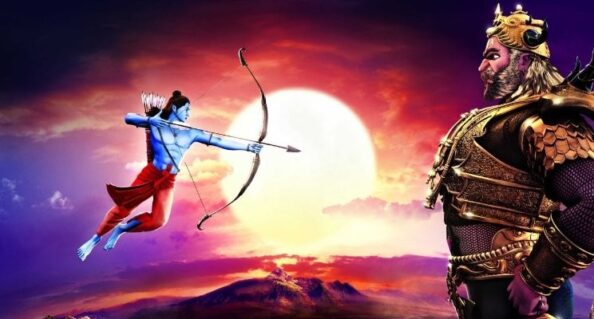
An image showing Lord Ram shooting Ravan with his bow and arrow
Now if you ask me, why Ravan kidnapped Sita? Was he so lustful that he would marry her at the cost of his life? No! The fact is that Ravan himself wanted to die at the hands of Lord Ram! Surprised? Well then let me tell you that facts reveal that Ravan actually knew that he was destined to die at the hands of Lord Ram, who was an avatar of God Vishnu. He was told that he would be killed by an avatar of Vishnu, and he knew that the Vishnu avatar was none other than Lord Ram. That’s the reason he abducted Lord Ram’s wife because he wanted Ram to come for him and kill him. After being killed by Lord Ram, Ravan attained salvation, which means he would never be reborn on Earth ever again. He died at the hands of God!
After Lord Ram shot Ravan, and he was on the verge of dying, Ram told his brother Lakshman to hurry and take blessings, words of wisdom, and life lessons from Ravan.
Lakshman approached the dying Ravan, stood at his head, and said, ” O the great learned Demon King, do not let your knowledge die with you. Share it with us and wash away your sins”. The dying Ravan did not respond to Lakshman and looked away.
An angry Lakshman went back to Ram and told him that Ravan was too arrogant to tell him anything. Ram comforted his brother and asked him softly, “Where did you stand while asking Ravan for knowledge?” Lakshman said, “Next to his head so that I can clearly hear what he had to say”.
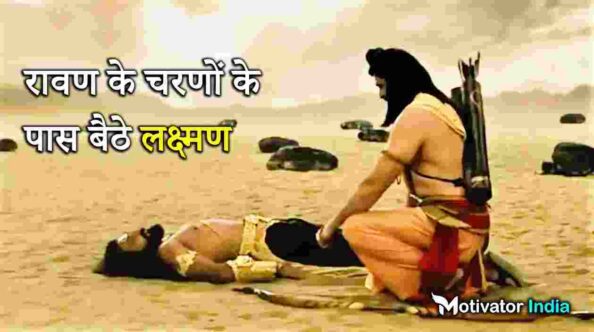
An image showing Lakshman sitting at the feet of the dying Ravan and gaining knowledge from him
Now, Ram walked to where Ravan lay. Lakshman watched in astonishment as his elder brother knelt at Ravan’s feet. With palms folded, he bowed before the dying Ravan. With extreme respect, Ram said to Ravan, “O Lord of Lanka, you abducted my wife, a terrible crime for which I have been forced to punish you. Now, you are no more my enemy. I bow to you and request you to share your wisdom with me. Please do that for if you die without doing so, all your wisdom will be lost forever to the world”. To Lakshman’s surprise, Ravan opened his eyes. He raised his arms to salute Ram and said, “If only I had more time as your teacher than as your enemy.”
Ravan further continued, “Standing at my feet as a student should, unlike your rude younger brother, you are a worthy recipient of my knowledge. I have very little time, so I cannot share much but let me tell you one important lesson I have learned in my life. Things that are bad for you, seduce you easily; you run towards them impatiently. But things that are actually good for you, fail to attract you; you shun them creatively, finding powerful excuses to justify your procrastination. That is why I was impatient to abduct Sita but avoided meeting you. This is the wisdom of my life, O Lord Ram. I salute you, and these are my last words. I give it to you”.
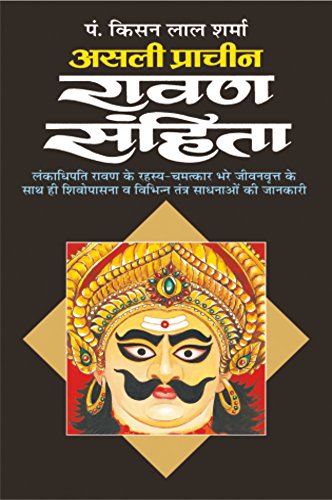
The cover of the original ancient “Ravan Samhita” book in Hindi
It was then Lakshman stood at Ravan’s feet respectfully and then Ravan narrated to him some life lessons which I am presenting before you.
- Do not be an enemy of your charioteer, your gatekeeper, your cook, and your brother. They can harm you anytime.
- Do not think you are always a winner, even if you are always winning.
- Always trust the minister who criticizes you.
- Never think of your enemy as weak or powerless, like I thought of Hanuman.
- Never think you can outsmart the stars, they will bring you what you are destined to.
- Either love or hate God, but both should be immense and strong.
It has been revealed by the Sri Lankan government that they have kept Ravan’s corpse preserved in a coffin which is 18 feet long, inside a cave in Sri Lanka. It is not known whether this claim by the Sri Lankan government is legitimate or not.
To end this, I would like to conclude with the saying–
II Rāmādivat Vartitavyaṃ Na Tu Rāvaṇādivat II
This means, “One should behave like Lord Ram and not like Ravan”.
Ram and Ravan are two men of contrasting characters in the Ramayana. Both had knowledge, wealth, and power. Ravan was a great learned man and he had studied the Vedas but he did not possess any sense of modesty or humanity. He tried to rule the three worlds, heaven, hell, and earth all by himself. He used his power to harm the noble and the pious. In contrast, Ram used his power and wealth to serve the people.
And also if you think that Adipurush has been taken from “Planet of the Apes”, then again you are mistaken. It was actually the “Planet of the Apes” that was hugely inspired by the Hindu epic Ramayana. Guys, I can go on narrating about Ramayana for eternity. But I believe this much knowledge of Ramayana is enough for the time being. I will see you guys in my upcoming reviews on The Movie Blog!
